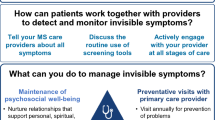Abstract
This article summarizes the experiences of 76 Euro-Americans and 24 African Americans who have multiple sclerosis (MS), a chronic neurological disease which affects 250,000–350,000 Americans. Although the majority of people with MS are young to middle-aged women of Northern European origin, African Americans, Asian Americans, Latinos, and Native Americans also have MS. This qualitative study explores the impact of race and gender on people's initial interpretation of symptoms, access to appropriate medical care, diagnosis, and adjustment to disability.
Similar content being viewed by others
REFERENCES
Batten HL: Analysis of aggregated MS chapters' needs assessment research: a report to the NMSS. Waltham, MA: The Bugel Institute for Research, 1991.
Minden S, Orav J, Reich P: Depression in MS. General Hospital Psychiatry 9: 426–443, 1987.
Crews D, Bindon J: Ethnicity as a taxonomic category in biomedical and biosocial research. Ethnicity and Disease 1: 42–49, 1991.
Littlefield A, Lieberman L, Reynolds T: Redefining race: the potential demise of a concept in physical anthropology. Current Anthropology 23: 641–655, 1982.
Barber E (ed): Racism, gender, and health. Medical Anthropology Quarterly 7, 1993.
Lieberman L, Jackson FL: Race and three models of human origin. American Anthropologist 97: 231–242, 1995.
Marshall P, Bennet L (eds): Culture and behavior in the AIDS epidemic. Medical Anthropology Quarterly 4, 1990.
Ayanian J, Epstein A: Differences in the use of procedures between women and men hospitalized for coronary artery disease. New England Journal of Medicine 266: 221–226, 1991.
Kenton EJ: Access to neurological care for minorities. Archives of Neurology 48: 480–485, 1991.
Brooks D, Smith D, Anderson R: Medical apartheid: an American perspective. JAMA 266: 2746–2750, 1991.
Smart JF, Smart DW: Acceptance of disability and the Mexican-American culture. Rehabilitation Counseling Bulletin 34: 357–367, 1991.
Magnus MH: Cardiovascular health among African-Americans: a review of the health status, risk, reduction, and intervention strategies. American Journal of Applied Rehabilitation Counseling 22: 43–45, 1991.
Fischer JM: A comparison between American Indian and non-Indian consumers of vocational rehabilitation services. Journal of Applied Rehabilitation Counseling 22: 43–45, 1991.
McLaughlin J, Zeeberg I: Self-care and multiple sclerosis: a view from two cultures. Social Science and Medicine 37: 315–330, 1993.
Seidel J, Friese S, Leonard DC: The Ethnograph (version 4.0). Amherst, MA: Qualis Research Associates, 1994.
Patton MQ: Qualitative Evaluation and Research Methods. Newbury Park, CA: Sage, 1990.
Feussner J. Smiel D: General internal medicine. JAMA 270: 209–212, 1993.
Meeuwesen L, Schaap C, van der Staak C: Verbal analysis of doctor-patient communication. Social Science and Medicine 32: 1143–1151, 1991.
Hahn R: Sickness and Healing: An Anthropological Perspective. New Haven: Yale, 1995.
Lindsey L: Gender Roles: A Sociological Perspective. New York: Prentice Hall, 1997.
Freeman J (ed): Women: A Feminist Perspective. Mountain View, CA: Mayfield, 1995.
Furino A, Munoz E: Health status among Hispanics: major themes and new priorities. JAMA 265: 255–258, 1991.
Goldstein A: Worlds apart: health care in Washington. The Washington Post (July 31, August 1, August 2), 1994.
Jenkins JH: The impress of extremity: women's experience of trauma and political violence. In Gender and Health: An International Perspective, CF Sargent and CB Brettell (eds). Upper Saddle River, NJ: Prentice Hall, 1996, pp. 278–291.
Tannen D: You Just Don't Understand: Women and Men in Conversation. New York: Ballantine Books, 1990.
Kugelmann R: Stress and its management: the cultural construction of an illness and its treatment in the anthropology of medicine: from culture to method. In The Anthropology of Medicine: From Culture to Method. L Romanucci-Ross, D Moerman, R Tancredi (eds). New York: Bergin and Garvey, 1991, pp. 371–388.
Chavez L, Hubbell A, McMullin J, Martinez R, Mishra S: Structure and meaning in models of breast and cervical cancer risk factors: a comparison of perceptions among Latinas, Anglo women, and physicians. Medical Anthropology Quarterly 9: 40–74, 1995.
Sargent C, Brettell C: Introduction: gender, medicine, and health. In Gender and Health: An International Perspective, C Sargent and C Brettell (eds). Upper Saddle River, NJ: Prentice Hall, 1996, pp. 1–28.
Rao S, Huber S, Bornstein R: Emotional changes with multiple sclerosis and Parkinson's disease. Journal of Consulting and Clinical Psychology 60: 369–379, 1992.
Minden S, Orav J, Reich P: Depression in MS. General Hospital Psychiatry 9: 426–443, 1987.
Minden S, Schiffer RB: Depression and mood disorders in MS. Neuropsychiatry, Neuropsychology, and Behavioral Neurology 4: 62–77, 1991.
Gergen KJ, Gergen MM: Narrative form and the construction of psychological science. In Narrative Psychology, TR Sarib (ed), 1986, p. 25.
Robinson I: Personal narratives, social careers, and medical courses: analyzing life histories in autobiographies of people with multiple sclerosis. Social Science and Medicine 30: 1173–1186, 1990.
Matson RR, Brooks NA: Adjusting to multiple sclerosis: an exploratory study. Social Science and Medicine 11: 145–150, 1977.
Miles A: Some psychosocial consequences of multiple sclerosis. British Journal of Medical Psychology 52: 321–331, 1979.
Stewart DC, Sullivan TJ: Illness behavior and the sick role: the case of multiple sclerosis. Social Science and Medicine 16: 1397–1404, 1982.
Pollack K: Mind and Matter: A study of conceptions of health and illness among three groups of English families with particular reference to MS, schizophrenia, and 'nervous breakdown'. Ph.D. thesis, Cambridge University.
Robinson I: Reconstructing lives: negotiating the meaning of MS. In Living with Chronic Illness, R Anderson, M Bury (eds). London: Unwin Hyman, 1988, pp. 43–66.
Gilmore D: Manhood in the Making: Cultural Concepts of Masculinity. New Haven: Yale, 1990.
Ward M: A World Full of Women. Needham Heights, MA: Allyn and Bacon, 1996.
Kleinman A: The Illness Narratives: Suffering, Healing, and the Human Condition. New York: Basic Books, 1988.
Author information
Authors and Affiliations
Corresponding author
Rights and permissions
About this article
Cite this article
Loveland, C.A. The Experiences of African Americans and Euro-Americans with Multiple Sclerosis. Sexuality and Disability 17, 19–35 (1999). https://doi.org/10.1023/A:1021499628918
Issue Date:
DOI: https://doi.org/10.1023/A:1021499628918




